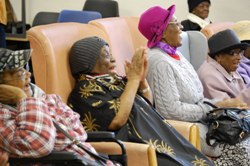Manchester. A world-famous city of firsts – ranging from computers, public libraries and professional football leagues, to test tube babies and the first Marks and Spencer store!
Now the city is leading the way again. Manchester’s arts and cultural offer enjoys international recognition. Yet there was little awareness of this among local older audiences who although living closest to the cultural offer, had little or no connection to it.
In common with many post-industrial landscapes, many of the city’s older residents live within a ‘doughnut of deprivation’ – neighbourhoods in closest proximity to the city centre some of which have been classed as disadvantaged, even deprived. This contrasts with city centre – a concentration of rich cultural opportunities, business wealth and vibrant regeneration.
Manchester’s response to this has been typically ground-breaking.
Galvanised by the public health team, the cultural sector made an impressive reply by developing programmes of activity connecting older people from some of Manchester’s most disadvantaged neighbourhoods with the city’s cultural offer.
Background to what we do (and another first!) The Manchester Ageing Strategy “A Great Place to Grow Older, 2010-2020” was developed by the Valuing Older People team (Public Health unit) a long-time supporter of the city’s cultural offer. This report envisions the creation of a city in which people thrive as they age. Cultural and creative activities enrich lives in many ways and extending creative and cultural opportunities is a core strategic objective.
Closely connected to achieving this objective is the activity of a working group made up of members of the Valuing Older People team combined with arts organisations (including museums, galleries, theatres and orchestras). This is a unique cross-artform and cross-sector working group whose key aims are:
to showcase current and planned activity, identify opportunities for collaboration, share learning, keep informed about developments in the wider arts and older landscape (in the UK and beyond)
The arts organisations whose offer makes up the programme are:
Band on the Wall * The Centre for Chinese Contemporary Art | The Bridgewater Hall * Manchester Art Gallery | The Gallery of Costume | Manchester Museum | The Hallé Orchestra | Museum of Science & Industry | HOME | Manchester Metropolitan University Special Collections | Manchester Camerata | Northern Chamber Orchestra | Ordsall Hall | People’s History Museum | START Salford | Salford Heritage Services | Whitworth Art Gallery | Royal Exchange Theatre
To coordinate activity, a grant from the Baring Foundation ‘Ageing Artfully’ programme enabled the creation of a half-time VOP Cultural Offer Manager post. Based with the national agency for arts audience development, The Audience Agency, there has now been a dramatic increase in the drive and energy.
And in 2010, Manchester became the first UK city to be accepted into the World Health Organisation’s (WHO) Global Network of Age-friendly Cities in recognition of the city’s work with older people.
Key qualifiers for this recognition included arts and cultural engagement with older people.

How we do it
PROJECTS & PROGRAMMES: arts organisations undertake a wide range of work with older people. The nature and scale of this work varies between different organisations and includes outreach programmes – a ‘mobile’ cultural offer eg handling boxes, mini-concerts, play-reading and creative writing groups, intergenerational projects, programmes with people with dementia using music and story-telling. Examples of this work include Manchester Camerata’s Music in Mind project; the Library Theatre’s Storybox project; Manchester Museum’s innovative approach to outreach; the Whitworth Art Gallery’s pioneering use of ipad apps co-created with older people to open up collections; and the Hallé orchestra’s engagement and community programme.
Some of this activity is delivered in nursing and residential homes, community settings and is achieved through partnership working with housing providers, frontline service providers and homeless charities.

Evaluation, learning and expertise is shared and through effective training a pool of creative practitioners is emerging that in turn are able to transfer skills and learning to others across sectors including the care sector.
CULTURE CHAMPIONS: Culture champions are enthusiastic informal arts ‘ambassadors’! Recruitment is targetted at older residents that serve as community ‘gatekeepers’ – for example, active volunteers, scheme managers, sheltered housing wardens, group organisers and older arts attenders.
Over 120 Champions are currently working with the arts organisations to engage their own social networks with the offer. They grasp opportunities to test new initiatives and ideas. Champions have participated in experimental theatre projects, programmed themed after-hours events at galleries, advised on funding applications and acted as informal consultants on museum redevelopment projects and cultural policy.
SHARING LEARNING: Manchester has hosted two successful national learning events funded by the Baring Foundation which have both clearly raised the profile of the work and there have been many opportunities to present at conferences, meetings and seminars around the UK and beyond about the programme. Members of the working group have been involved in national and international learning and development programmes (Museums European Learning Network – LEM and the Age Collective initiative led by the British Museum).
Manchester partners have led the development of a national programme of arts and older people enquiry visits to support other Local Authorities to develop a more strategic approach to arts and older people. This network of ‘Age-Friendly cities recently focussed on the theme of arts and older people and
A full review of the programme and Culture Champion scheme has been carried out by the Audience Agency. The report and an executive summary document are available by emailing Sherry Dewynter. A website for the entire programme is currently in development.
So in this city of firsts we have a great story to tell, of extensive knowledge and experience; a pool of skilled artists; a proven track record of project excellence; a growing evidence base of the benefits of creative activity; and, crucially, older people at the heart of what we do.
Back to top




